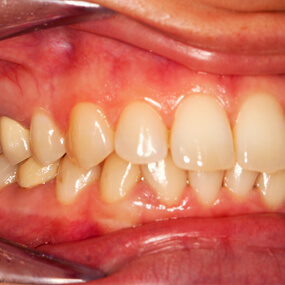How Poor Oral Health Can Worsen COVID-19 Symptoms

You have heard the advice many times: brush and floss daily and see your dentist twice a year in order to keep your teeth and gums as healthy as possible. But did you know that routine oral care is also essential to your overall health? This dynamic is well supported by many clinical studies that have shown a link between poor oral health and certain health conditions: diabetes, cardiovascular diseases, COPD, rheumatoid arthritis, and various pregnancy complications. Iain Chapple—Head of the School of Dentistry at the University of Birmingham—said, “The mouth is the doorway to the body, rather than a separate organ, and is the access point for bacteria to enter the bloodstream via the gums.”
Researching the Link Between Oral and Systemic Health
A recent example of research demonstrating the link between systemic and oral health can be found in London, where researchers were examining data related to COVID-19. Their paper— Could There Be a Link Between Oral Hygiene and the Severity of SARS-CoV-2 Infections?—was published in the British Dental Journal in June 2020. The research was conducted at the Centre for Nutrition Education & Lifestyle Management, and upon completion of the study, the researchers made a case that poor oral hygiene was indeed worsening symptoms due to the higher levels of inflammatory products in the bloodstream.
The Coronavirus Pandemic
Incidents of the COVID-19 disease have been on the rise since December 2019. In January 2020, the World Health Organization declared it a pandemic. As of this writing, more than 80 million have been infected worldwide, and more than 1.7 million deaths have been attributed to the infection.
Researchers throughout the world have identified risk factors that contribute to severe outcomes. Many patients recover without complications as if it were nothing more than the flu, but others are hospitalized and require supplemental oxygen or even ventilation in dire cases. These risk factors include obesity, hypertension, and cardiovascular disease. One particular research group noted that the primary complications include acute respiratory distress syndrome, blood clots, sepsis, and septic shock. Such patients often have comorbidities and, thus, bacterial overload. However, the team also noted that about 52 percent of COVID-19-related deaths happen in otherwise healthy people and cannot yet be explained.
COVID-19 Outcomes and Bacterial Load
The aforementioned research team speculates that there may be a connection between the infection and bacterial load. Bacterial load is also called bacterial burden. The team sought to determine if preexisting high levels of bacteria or bacterial superinfections—often associated with pneumonia, respiratory distress syndrome, and sepsis—could be linked to negative outcomes from COVID-19.
Oral Health and COVID-19
The study continued by exploring the COVID-19-related complications in people with poor oral health and periodontal disease in particular. Researchers would examine the oral microbiome and characterize it, which allowed for cross-referencing with the outcome. The goal was to determine if high bacterial load in the mouth led to more severe symptoms and if improved oral care could make a difference.
It was noted by the authors that during a lung infection, a patient is at greater risk of inhaling bacteria from the mouth into the lungs, which can cause further infection. Periodontitis or any gum infection are the leading causes for these harmful bacteria to be present in the mouth, and these bacteria, as well as the cytokines they trigger, can be detected by testing the saliva. In the end, the team concluded that poor oral hygiene does significantly increase the risk of interbacterial exchanges between the lungs and mouth and that such exchanges greatly increase the risk of superinfections and other complications.
Long before the pandemic, medicine had recognized good oral hygiene as a preventative for airway infections in patients—those over age 70 in particular. People with periodontitis are three times as likely to become diabetic. They also increase their risk of heart disease by 25 percent and their risk of hypertension by 20 percent. These are all notable COVID-19 risk factors.
In Conclusion
The study found that 20 percent of people who suffered severe illness from COVID-19 had high levels of bacteria and inflammatory markers and a high neutrophil-to-lymphocyte count in the mouth. Researchers also demonstrated a correlation between the oral microbiome and the severity of illness. In conclusion, the team again enumerated the four primary risk factors: obesity, diabetes, heart disease, and hypertension. The recommendation presented was to maintain oral hygiene and improve it if necessary in order to reduce the bacterial burden in the mouth and therefore limit the risk of superinfection. These preventative measures are important for everyone but in particular for those people with the aforementioned risk factors.
Safeguard Your Oral Health and Your Overall Well-Being
During the pandemic, it is more important than ever to ensure good oral health. Jeffrey D. Clark, DDS, recommends daily care at home but also maintaining your regular cleanings and checkups here at Scottsdale Cosmetic Dentistry Excellence. We understand that patients may experience additional anxieties about visiting your dentist at this time and want to put your mind at ease. Our office has implemented a series of stringent hygiene and sanitation measures and has exceeded the standards set forth by the Arizona Dental Association in addition to the ADA, CDC, and OSHA. Call us today at 480 585 1853 with any questions and to schedule an appointment.
Journal reference:
Sampson, V., Kamona, N. & Sampson, A. Could there be a link between oral hygiene and the severity of SARS-CoV-2 infections?. Br Dent J 228, 971–975 (2020). https://doi.org/10.1038/s41415-020-1747-8, https://www.nature.com/articles/s41415-020-1747-8




